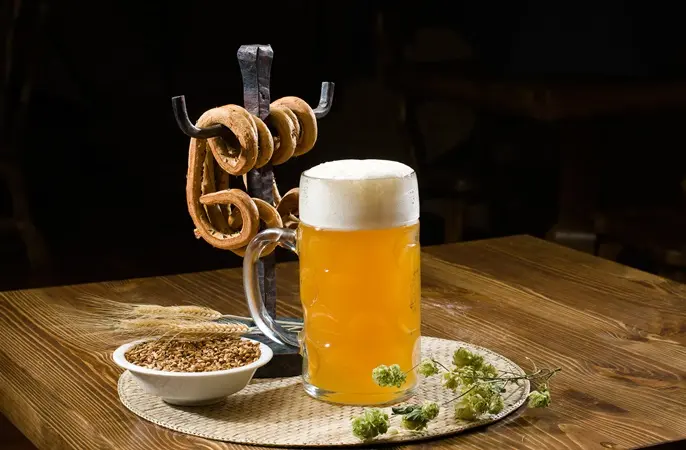Natural Light Beer, commonly known as Natty Light, is a popular American lager produced by Anheuser-Busch. Known for its light body, low calorie count, and affordability, it appeals to a wide range of consumers. A question that often arises among health-conscious individuals and beer enthusiasts alike is: How much sodium is in Natural Light Beer? Understanding the sodium content in beer, including Natural Light, is important for those who monitor their sodium intake for health reasons. This article provides a detailed exploration of sodium levels in Natural Light Beer, how sodium affects health, and practical tips for managing sodium consumption.
The Basics of Sodium in Beer
Sodium is a mineral that is present in various foods and beverages, including beer. In beer, sodium primarily comes from the water used in the brewing process and the ingredients added during production.
Role of Sodium in Brewing
Water Chemistry: Sodium is a natural component of water and can influence the flavor and mouthfeel of beer. Breweries use water with specific mineral profiles to achieve desired taste characteristics, and sodium is one of the minerals considered.
Ingredient Additions: While sodium is not typically added directly to beer, it can be present in trace amounts due to the water and other ingredients used in brewing. The overall sodium content in beer is generally low compared to other sources of sodium in the diet.
Sodium Content in Natural Light Beer
To determine how much sodium is in Natural Light Beer, it’s helpful to look at specific nutritional information and compare it to other beers and food products.
1. Nutritional Information of Natural Light Beer
Standard Serving Size: Natural Light Beer is commonly served in a 12-ounce (355 milliliter) can or bottle. Nutritional information is often based on this standard serving size.
Sodium Content: According to nutritional data provided by Anheuser-Busch and various food databases, Natural Light Beer contains approximately 10 milligrams of sodium per 12-ounce serving. This amount is relatively low compared to many processed foods and beverages.
2. Comparison with Other Beers
Light Beers: Light beers like Natural Light are designed to be lower in calories and carbohydrates, and they typically have lower sodium content compared to regular beers. The sodium content in light beers generally falls within the same range as Natural Light.
Regular Beers: Regular beers, such as lagers and ales, often have slightly higher sodium levels than light beers, but the difference is usually minimal. Sodium content in regular beers can range from 10 to 20 milligrams per 12-ounce serving.
See Also: Does Non Alcoholic Beer Have Negative Effects?
The Impact of Sodium on Health
Understanding the health implications of sodium consumption is crucial for making informed dietary choices.
1. Sodium and Blood Pressure
Hypertension: Excessive sodium intake is linked to high blood pressure (hypertension), which can increase the risk of heart disease and stroke. The American Heart Association recommends limiting sodium intake to no more than 2,300 milligrams per day, with an ideal limit of 1,500 milligrams for most adults.
Dietary Sources: While beer contributes to overall sodium intake, its contribution is relatively minor compared to other sources, such as processed foods, canned soups, and salty snacks.
2. Sodium and Fluid Balance
Fluid Retention: Sodium plays a role in regulating fluid balance in the body. High sodium intake can lead to fluid retention, which may cause swelling and discomfort. Monitoring sodium intake can help manage fluid balance and reduce the risk of related issues.
Hydration: Beer, including Natural Light, has a diuretic effect due to its alcohol content, which can contribute to dehydration. While sodium in beer is low, it’s still important to stay hydrated by drinking water alongside alcoholic beverages.
Managing Sodium Intake
For those who need to monitor their sodium intake for health reasons, there are several strategies to manage and reduce sodium consumption.
1. Read Nutritional Labels
Check Labels: Always check the nutritional labels on food and beverage products, including beer, to be aware of their sodium content. While Natural Light Beer has a low sodium content, other products you consume may contribute more significantly to your sodium intake.
Compare Products: Compare the sodium content of different beers and food items to make informed choices. Opting for products with lower sodium content can help you stay within your daily sodium limits.
2. Choose Low-Sodium Alternatives
Low-Sodium Foods: Incorporate low-sodium foods into your diet to balance your overall sodium intake. Fresh fruits, vegetables, and unprocessed foods are generally low in sodium.
Alternative Beverages: If you are concerned about sodium intake from beer, consider non-alcoholic beverages or other low-sodium alcoholic options. Non-alcoholic beers typically have similar sodium levels to their alcoholic counterparts.
3. Hydrate Properly
Drink Water: Ensure you stay hydrated by drinking plenty of water throughout the day, especially when consuming alcoholic beverages. Proper hydration helps manage fluid balance and counteracts the diuretic effects of alcohol.
Balance Alcohol Intake: Be mindful of the amount of alcohol you consume and how it fits into your overall dietary and health goals. Moderation is key to managing sodium and alcohol intake effectively.
Conclusion
How much sodium is in Natural Light Beer? Natural Light Beer contains approximately 10 milligrams of sodium per 12-ounce serving, which is relatively low compared to many other foods and beverages. While the sodium content in Natural Light is minor, it is essential to consider overall sodium intake from all sources in your diet.
By understanding the sodium content in Natural Light Beer and employing strategies to manage sodium intake, you can make informed choices that align with your health goals. Remember to read nutritional labels, choose low-sodium alternatives, and stay hydrated to effectively manage sodium consumption and support overall health.


